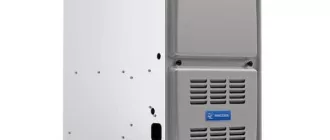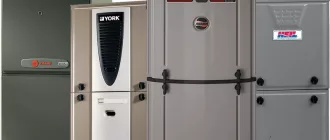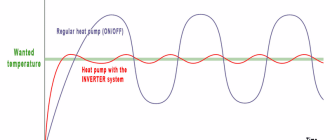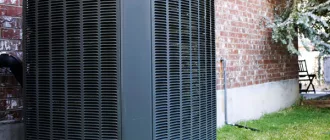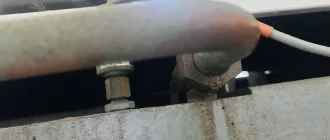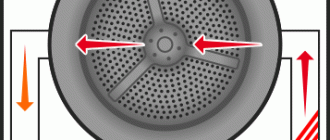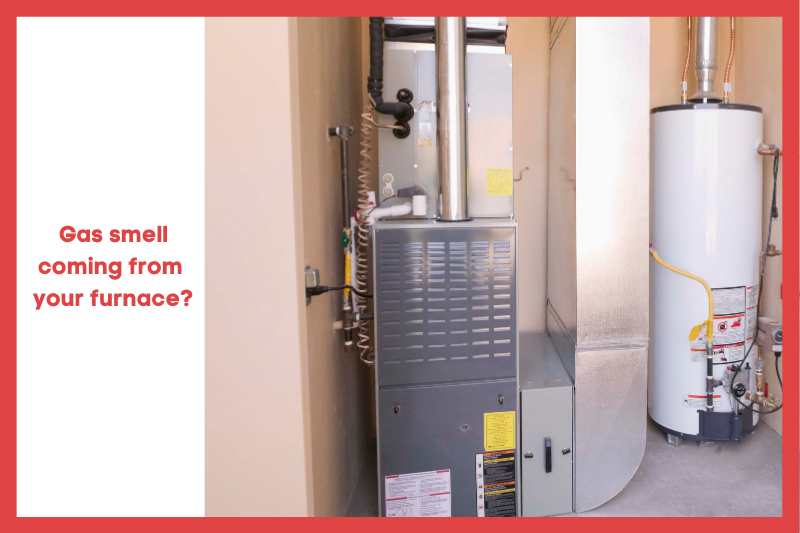
Is It Normal to Smell Gas Near a Furnace?
Gas smell near furnaces can be a cause for concern and should not be ignored. It is important to understand the potential causes of this odor and what steps to take next in order to ensure the safety of your home and family.
One common cause of a gas smell near furnaces is a gas leak. Gas leaks can be dangerous and should be addressed immediately. If you detect a strong gas smell near your furnace, it is important to evacuate the area and contact your gas provider or emergency services right away. They will be able to assess the situation and take the necessary steps to fix the issue.
Another potential cause of a gas smell near furnaces is a problem with the furnace itself. Over time, furnaces can develop cracks or other issues that can leak gas into the surrounding area. If you suspect that your furnace is the cause of the gas smell, it is recommended to turn off the furnace and contact a professional HVAC technician to inspect and repair the unit.
In some cases, the gas smell near furnaces may be caused by a buildup of debris or dust in the ventilation system. This can prevent proper airflow and cause gas to linger in the area. Regular maintenance and cleaning of the furnace and ventilation system can help prevent this issue. If you notice a gas smell and suspect it may be due to a dirty ventilation system, it is best to contact a professional HVAC technician for a thorough cleaning.
Remember, a gas smell near furnaces should never be ignored. It is important to take immediate action to ensure the safety of your home and family. Contact your gas provider or emergency services if you suspect a gas leak, and consult a professional HVAC technician for any issues with your furnace or ventilation system.
Exploring Common Causes of Gas Smell near Furnaces
Gas smell near furnaces can be a cause for concern and should never be ignored. It is important to determine the cause of the gas smell and take appropriate actions to ensure the safety of your home and family. Here are some common causes of gas smell near furnaces:
1. Gas Leak
A gas leak is the most serious and dangerous cause of gas smell near furnaces. It can occur due to a faulty connection or a damaged gas line. If you suspect a gas leak, it is important to immediately evacuate your home and call your gas company or emergency services. Do not use any electrical devices or light a flame, as it can ignite the gas.
2. Cracked Heat Exchanger
A cracked heat exchanger can also cause a gas smell near furnaces. The heat exchanger is responsible for transferring heat from the burner to the air that circulates in your home. If it is cracked, it can release gas into the air. In this case, it is important to shut off the furnace and contact a professional technician for repair or replacement.
3. Dirty Burners
Dirty burners can lead to incomplete combustion of the gas, resulting in a gas smell near furnaces. The build-up of dirt and debris on the burners can disrupt the proper mixing of gas and air. Regular cleaning and maintenance of the burners can help prevent this issue. Consult the furnace manual or contact a professional technician for proper cleaning instructions.
4. Clogged Chimney or Vent
If the chimney or vent that removes the combustion gases from the furnace is clogged, it can lead to a gas smell near furnaces. The gases can back up into your home instead of being properly vented outside. Inspect the chimney or vent for any obstructions and clean or clear them if necessary. It is recommended to hire a professional for this task to ensure safety and correct installation.
5. Fuel Supply Issues
Problems with the fuel supply, such as low gas pressure or a malfunctioning gas valve, can also result in a gas smell near furnaces. Check the gas pressure and valve settings to ensure they are within the recommended range. If you are not familiar with these procedures, it is best to hire a professional technician to inspect and adjust the fuel supply.
It is important to note that if you detect a gas smell near furnaces, you should not try to diagnose or repair the issue yourself unless you have the necessary knowledge and experience. Gas-related issues can be dangerous and should be handled by professionals.
In conclusion, gas smell near furnaces can be caused by a variety of factors, including gas leaks, cracked heat exchangers, dirty burners, clogged chimneys or vents, and fuel supply issues. It is crucial to identify and address the cause promptly to ensure the safety of your home and loved ones.
Understanding Gas Smell near Furnaces
Gas smell near furnaces can be a cause for concern as it poses a potential safety risk. Understanding the possible causes of this smell can help you take appropriate actions to address the issue.
Possible Causes:
- Gas Leak: The most common cause of gas smell near furnaces is a gas leak. Leaks can occur due to damaged gas lines, faulty connections, or aging pipes. It is important to identify and fix the leak as soon as possible to prevent any hazards.
- Pilot Light Issues: If the pilot light of your furnace goes out or is not functioning correctly, it can lead to the release of gas fumes. Do thorough checks to ensure that the pilot light is properly ignited and functioning.
- Clogged Ventilation: A blocked or clogged ventilation system can cause gas buildup, leading to a gas smell. Regularly cleaning and maintaining the ventilation system is essential to prevent this issue.
- Improper Combustion: When the fuel does not burn completely, it can produce a gas smell. This can occur due to dirty burners, improper air or fuel mixture, or other combustion issues. Regular maintenance and cleaning of the furnace can help prevent improper combustion.
What to Do Next:
- If you detect a strong gas smell near your furnace, ensure your safety by immediately leaving the area and calling your gas company or emergency services. They will provide guidance on how to proceed.
- If the smell is mild or intermittent, you can start by checking for obvious signs of gas leaks, such as hissing sounds or damaged gas lines. However, do not attempt to repair a gas leak yourself. Contact a professional HVAC technician to handle the issue.
- Regularly schedule professional inspections and maintenance for your furnace to identify and address any potential issues before they become major problems.
- Consider installing a carbon monoxide detector near your furnace. Carbon monoxide is an odorless and dangerous gas that can be produced during combustion. A detector can alert you if there are unsafe levels of carbon monoxide in your home.
Remember, a gas smell near your furnace should never be ignored. It is crucial to prioritize safety and take immediate action to ensure the well-being of yourself and your household.
Possible Safety Concerns
If you detect a gas smell near your furnace, it is important to take immediate action to ensure the safety of your home and family. Gas leaks can be dangerous and pose a significant risk of fire or explosion. Here are some possible safety concerns associated with a gas smell near furnaces:
- Fire Hazard: Gas leaks can easily ignite if exposed to an open flame or spark. This can lead to a fire that spreads rapidly and causes extensive damage to your property.
- Explosion Risk: In extreme cases, a gas leak can accumulate in an enclosed space and create an explosive atmosphere. Any ignition source in the vicinity can trigger an explosion, causing severe damage and potential harm to occupants.
- Carbon Monoxide Poisoning: Incomplete combustion of natural gas can produce carbon monoxide (CO), a colorless and odorless gas that is highly toxic. Breathing in high levels of CO can lead to symptoms such as dizziness, headache, nausea, and even death in severe cases.
- Suffocation Hazard: If there is a gas leak, the oxygen levels in the area can be significantly reduced, leading to an oxygen-deficient environment. Prolonged exposure to such an environment can cause suffocation and loss of consciousness.
- Health Effects: Even if a gas leak does not result in an explosion or fire, the presence of natural gas can cause health issues such as respiratory problems, eye and throat irritation, and allergic reactions.
If you notice a gas smell near your furnace, it is crucial to take the following steps to address the safety concerns:
- Evacuate: If you suspect a gas leak, evacuate the premises immediately. Do not use any electrical devices, turn on or off lights, or operate any appliances that could create a spark.
- Call Emergency Services: Contact your local gas company or emergency services to report the gas smell and follow their instructions. They will guide you on what steps to take next and may send a technician to assess the situation.
- Do Not Attempt Repairs: Do not try to repair a gas leak on your own. Leave it to the professionals who have the necessary expertise and equipment to handle gas leaks safely.
- Prevent Open Flames: Avoid lighting matches, using candles, or smoking near the area of the suspected gas leak. These activities can ignite the gas and cause an explosion.
- Open Windows and Doors: If it is safe to do so, open windows and doors to ventilate the area. This can help dissipate the gas and reduce the risk of buildup.
- Install Carbon Monoxide Detectors: Consider installing carbon monoxide detectors in your home to ensure early detection of gas leaks and prevent carbon monoxide poisoning.
Remember, safety should always be your top priority when dealing with a gas smell near your furnace. Taking immediate action and seeking professional help is crucial to protect yourself and your loved ones from potential hazards.
Malfunctioning Furnace
A malfunctioning furnace can also be a common cause of a gas smell near furnaces. Here are a few possible reasons why a furnace may be emitting a gas smell:
- Gas Leak: A gas leak in the furnace can cause a strong gas smell. This could be due to a faulty gas valve, loose or damaged gas line connections, or a cracked heat exchanger. Gas leaks can be dangerous and should be addressed immediately. If you suspect a gas leak, evacuate the area and contact your gas provider and a professional HVAC technician.
- Incomplete Combustion: If the fuel is not fully combusted, it can result in the production of gas byproducts, including carbon monoxide. This can happen if the furnace is not properly adjusted or if there is a lack of oxygen supply. Incomplete combustion can lead to a gas smell and is a serious safety concern. It is important to have a professional technician inspect and service the furnace regularly to ensure proper combustion.
- Ignition Issues: If the furnace is having trouble igniting, it may release a gas smell. This could be due to a faulty ignition system, a dirty pilot light, or a malfunctioning sensor. Ignition issues should be addressed promptly to prevent the buildup of gas in the furnace, which can be hazardous.
If you detect a gas smell near your furnace and suspect a malfunctioning furnace, it is important to take immediate action. Contact a licensed HVAC technician to inspect and repair the furnace. They will be able to diagnose the cause of the gas smell and take the necessary steps to ensure your furnace is operating safely.
Gas Leaks
Gas leaks near furnaces can be extremely dangerous and should be taken seriously. Gas leaks can occur for several reasons, including faulty connections, worn-out seals, or damaged pipes. If you suspect a gas leak near your furnace, it is important to take immediate action to protect yourself and your property.
If you notice a strong smell of gas near your furnace, follow these steps:
- Turn off the furnace: Locate the power switch for your furnace and turn it off immediately. This will help minimize the risk of a fire or explosion.
- Open windows and doors: Ventilate the area by opening windows and doors. This will help dissipate any gas fumes and reduce the risk of ignition.
- Do not light any flames: Do not light matches, candles, or any other open flames. Gas is highly flammable and can ignite easily.
- Evacuate the building: If you are unable to locate or stop the source of the gas leak, evacuate the building and call emergency services from a safe location.
Once you have taken these immediate safety measures, it is important to call a licensed professional to inspect and repair the gas leak. Do not attempt to fix the issue yourself, as this can be dangerous and may result in further damage or injury.
In some cases, you may also want to contact your gas utility provider to report the leak and request assistance. They will be able to provide guidance and support during the repair process.
Remember, gas leaks near furnaces can pose serious risks to your safety and should not be ignored. Taking quick action and seeking professional assistance is essential to ensure your home and family remain safe.
Inadequate Airflow
One common cause of gas smell near furnaces is inadequate airflow. When the airflow in your furnace is restricted or insufficient, it can lead to the buildup of gas fumes. Here are some potential reasons for inadequate airflow and what you can do to address them:
- Clogged air filters: Over time, the air filters in your furnace can become clogged with dirt, dust, and debris. This restricts the airflow and reduces the efficiency of the system. To address this issue, regularly clean or replace the air filters.
- Blocked vents or registers: Obstructions in the vents or registers can also restrict the airflow. Make sure that all vents and registers are clear and unobstructed. Check for any furniture, curtains, or other objects that may be blocking the airflow.
- Damaged ductwork: If there are leaks or damage in the ductwork, it can affect the airflow. Inspect the ductwork for any signs of damage or loose connections. Seal any leaks or consider repairing or replacing damaged ductwork.
- Inadequate return air: The return air registers are responsible for pulling in air from the rooms and sending it back to the furnace. If there are obstructions around the return air registers or if they are too small, it can reduce the airflow. Check that the return air registers are unobstructed and consider increasing their size if necessary.
It’s important to address inadequate airflow issues promptly to avoid the buildup of gas fumes, which can be hazardous. If you’re unsure about how to address these issues or if you continue to experience a gas smell near your furnace, it’s recommended to contact a professional HVAC technician for further inspection and repairs.
Combustion Problems
Combustion problems can be a major cause of gas smell near furnaces. When the combustion process in your furnace is not functioning properly, it can lead to an accumulation of gas that is not being burned off. This can result in a strong gas smell in and around your furnace.
There are several potential combustion problems that can cause a gas smell near your furnace:
- Dirty or clogged burners: Over time, dirt, dust, and debris can accumulate on the burners in your furnace. When the burners are dirty or clogged, they may not ignite properly, leading to inefficient combustion and the release of unburned gas.
- Malfunctioning pilot light: If the pilot light in your furnace is not functioning correctly, it may not be lighting the main burner properly. This can lead to incomplete combustion and the production of a gas odor.
- Cracked heat exchanger: A cracked heat exchanger can also cause combustion problems. The heat exchanger is responsible for transferring heat from the burner to the surrounding air. If it is cracked, gas may leak out into the surrounding area.
What to do next:
If you suspect that combustion problems are causing the gas smell near your furnace, it is important to take action promptly. Here are some steps you can take:
- Shut off the furnace: If you notice a strong gas smell, turn off your furnace immediately. This will help prevent further gas from being released into your home.
- Open windows and doors: To ventilate your home and remove any gas fumes, open windows and doors. This will help ensure that the gas smell dissipates quickly.
- Contact a professional: It is recommended to contact a professional HVAC technician to inspect and repair your furnace. They will be able to identify the specific combustion problem and take the necessary steps to fix it.
Remember, dealing with combustion problems can be dangerous, as gas leaks can pose a serious safety risk. It’s always best to leave the diagnosis and repair to trained professionals.
Incomplete Fuel Burn
Incomplete fuel burn is another common cause of gas smell near furnaces. When fuel does not burn completely, it can release unburned gas into the air, leading to a distinctive odor. This can happen due to a variety of factors, including:
- Dirty or clogged burners: Over time, dust, dirt, and debris can accumulate on the burners, preventing proper combustion and causing incomplete fuel burn.
- Malfunctioning ignition system: If the ignition system is not working properly, it may not ignite the fuel completely, leading to incomplete combustion.
- Incorrect air-to-fuel ratio: If the air-to-fuel ratio is not balanced, there may not be enough oxygen for complete combustion, resulting in unburned gas.
- Faulty gas valve: If the gas valve is faulty, it may not regulate the flow of gas properly, leading to incomplete combustion.
- Blocked flue or vent: A blocked flue or vent can prevent the proper flow of combustion gases, causing incomplete fuel burn.
If you notice a gas smell near your furnace, it is important to address the issue promptly. Incomplete fuel burn can not only be a safety hazard but can also indicate that your furnace is not operating efficiently, leading to higher energy bills and potential damage to the unit. It is recommended to contact a qualified HVAC technician to inspect your furnace and identify and resolve the source of the gas smell.
Improper Ventilation
One common cause of a gas smell near furnaces is improper ventilation. Furnaces need proper ventilation to safely operate and expel byproducts like carbon monoxide. If ventilation is inadequate, it can lead to a buildup of gas smells in the surrounding area.
There are several reasons why ventilation may be improper:
- Blocked or dirty vents: Over time, vents can become blocked or clogged with debris such as dust, dirt, or even bird nests. This can restrict the flow of air and gas, resulting in a gas smell near the furnace.
- Improperly sized vents: If the vents are not the correct size for the furnace, it can cause improper airflow. This can lead to a gas smell as the byproducts of combustion cannot be adequately expelled.
- Disconnected or damaged vents: Ventilation systems can become disconnected or damaged, allowing gas and fumes to escape into the surrounding area instead of being properly vented outside.
If you suspect improper ventilation as the cause of the gas smell near your furnace, it is important to take immediate action:
- Turn off the furnace: Shut off the furnace and ensure that it is not producing any additional gas or fumes.
- Open windows and doors: Provide ventilation by opening windows and doors to allow fresh air to circulate and help dispel the gas smell.
- Have the ventilation system inspected: Contact a professional HVAC technician to inspect and clean the ventilation system. They can identify any blockages, damage, or sizing issues and make the necessary repairs or adjustments.
- Install carbon monoxide detectors: To ensure the safety of your home and family, consider installing carbon monoxide detectors near your furnace and throughout your home. These detectors will alert you if there are high levels of carbon monoxide present.
Proper ventilation is essential for the safe operation of your furnace. If you notice a gas smell near your furnace, it is crucial to address the issue promptly to prevent any potential dangers. By taking the necessary steps to ensure proper ventilation, you can maintain a safe and odor-free environment in your home.
Clogged or Dirty Filters
One of the common causes of gas smell near furnaces is clogged or dirty filters. Furnace filters help to trap dust, dirt, and other particles from entering into the system. However, over time, these filters can become clogged with debris and require cleaning or replacement.
When the filters are clogged or dirty, they can restrict the airflow and cause the furnace to work harder, ultimately leading to overheating. This overheating can result in the release of gas smells.
To resolve this issue:
- Switch off the furnace and disconnect the power source to ensure safety.
- Locate the furnace filter. It is usually found near the blower motor or the return air duct.
- Remove the filter and inspect it for dirt, dust, or clogs. If it is dirty, consider cleaning it or replace it with a new one.
- If cleaning the filter, gently tap it on a hard surface or rinse it with water until the dirt is removed. Allow it to air dry completely before reinserting.
- If replacing the filter, ensure you purchase the correct size and type for your furnace.
- Once the filter is clean or replaced, reinsert it into the furnace, ensuring it is properly aligned.
- Reconnect the power source and switch on the furnace.
Regularly inspecting and cleaning or replacing the furnace filters can help prevent clogs and maintain the proper airflow, reducing the chances of gas smells near the furnace.
Broken Heat Exchanger
A broken heat exchanger is a common cause of gas smell near furnaces. The heat exchanger is a crucial component of the furnace that transfers heat from the combustion process to the air. When the heat exchanger becomes cracked or damaged, it can lead to a gas smell in your home.
Causes:
- Normal wear and tear over time can cause the heat exchanger to develop cracks or holes.
- Poor maintenance, such as not regularly changing the air filter, can contribute to the deterioration of the heat exchanger.
- Improper installation or sizing of the heat exchanger can lead to early failure.
Signs of a broken heat exchanger:
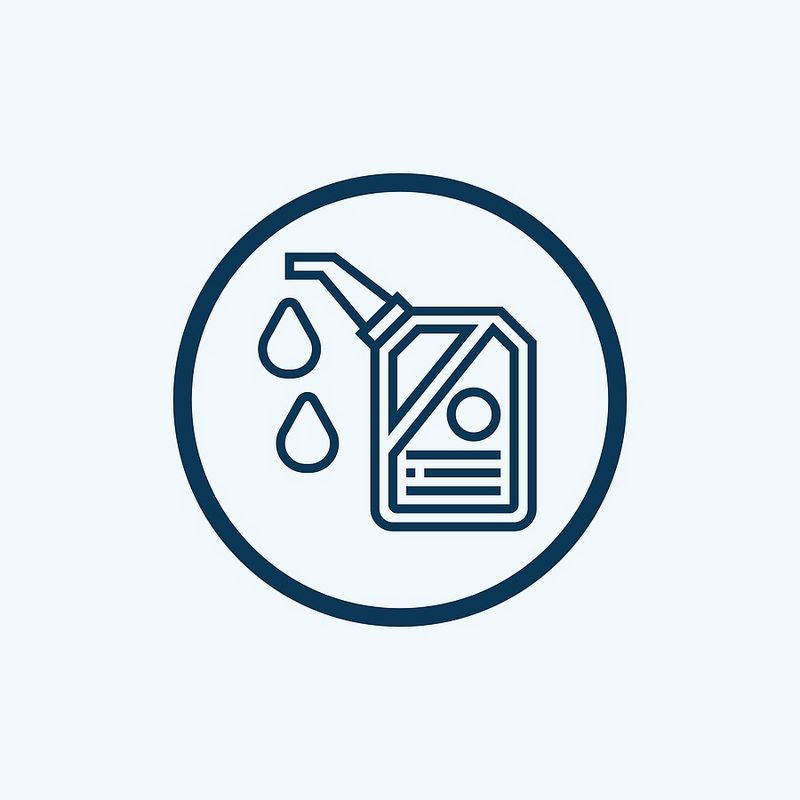
- A strong odor of natural gas near the furnace.
- Visible cracks or holes in the heat exchanger.
- Carbon monoxide alarms going off.
- Soot or black residue on the furnace or surrounding area.
What to do:
- If you suspect a broken heat exchanger, it is important to turn off the furnace immediately and contact a qualified HVAC technician.
- Do not attempt to repair the heat exchanger yourself, as it requires professional knowledge and expertise.
- A professional HVAC technician will inspect the heat exchanger and determine whether repair or replacement is necessary.
- In some cases, a minor crack or hole can be repaired, but in most cases, replacement of the heat exchanger is recommended to ensure safety and prevent further issues.
- Regular maintenance and inspection of the furnace can help prevent heat exchanger issues and detect any potential problems early on.
Conclusion:
A broken heat exchanger can cause a gas smell near furnaces and pose a serious safety risk. It is important to address any issues with the heat exchanger promptly to avoid potential hazards and ensure safe operation of your furnace.
Problems with Pilot Light
Pilot light is a small flame that is constantly burning to ignite the main burner of the furnace when heat is needed. If you notice a gas smell near your furnace, it could be due to various issues related to the pilot light. Some of the common problems with the pilot light are:
- Extinguished pilot light: If the pilot light is out, it won’t be able to ignite the main burner, resulting in a gas smell. This can happen due to various reasons such as a draft, a malfunctioning thermocouple, or a clogged pilot tube. If you suspect the pilot light is out, follow the manufacturer’s instructions to relight it or contact a professional for assistance.
- Weak pilot light: If the pilot light is burning, but the flame is weak, it may not be able to ignite the main burner properly. This can be caused by a dirty or clogged pilot orifice, which can be cleaned using a small wire or by contacting a professional.
- Dirty flame sensor: The flame sensor is responsible for detecting whether the pilot light is lit. If it is dirty or covered in soot, it may not function properly and can cause gas smell. Cleaning the flame sensor with a soft cloth or contacting a professional can solve this issue.
- Faulty thermocouple: The thermocouple is a safety device that senses the presence of the pilot light. If it is malfunctioning or not properly positioned, it can prevent the main burner from igniting and cause a gas smell. Contact a professional to inspect and replace the thermocouple if needed.
If you experience a gas smell near your furnace, it is essential to address the problem promptly to ensure your safety. Always follow the manufacturer’s instructions or seek professional help for any issues related to the pilot light.
Blocked or Restricted Vents
If you notice a gas smell near your furnace, one potential cause could be blocked or restricted vents. Vents allow for the proper circulation of air, which is essential for the safe and efficient operation of your furnace. When vents are blocked or restricted, it can lead to a buildup of gas and result in a noticeable smell.
Possible Causes:
- Dirt, dust, or debris accumulation in the vents
- Furniture or other objects blocking the vents
- Improperly installed vent covers
- Blocked or obstructed air return vents
What to Do:
- Check the vents: Inspect the vents to ensure there is no debris or blockage. If you notice any dirt or dust, clean the vents using a vacuum cleaner or a soft brush.
- Remove any obstructions: If furniture or other objects are blocking the vents, move them away to allow for proper air circulation.
- Inspect the vent covers: Make sure the vent covers are properly installed and not obstructing the airflow. Adjust or reinstall them if necessary.
- Ensure air return vents are clear: Blocked or obstructed air return vents can also restrict airflow and cause a gas smell. Check and clear any obstructions from the air return vents.
- Call a professional: If you have checked the vents and removed any obstructions, but the gas smell persists, it is best to call a professional HVAC technician. They can further inspect your furnace system and address any underlying issues.
Avoid attempting any repairs or modifications to your furnace system if you are not qualified or experienced in HVAC work. Safety should always be a top priority when dealing with gas appliances.
Flue Pipe Obstructions
A flue pipe obstruction is another common cause of gas smell near furnaces. The flue pipe is responsible for carrying the exhaust gases produced by the furnace out of your house. When the flue pipe becomes obstructed, the gases can’t escape properly, leading to a build-up of gas inside your home.
There are several potential obstructions that can occur in a flue pipe:
- Debris: Over time, debris such as leaves, twigs, or even bird nests can accumulate in the flue pipe, blocking the flow of exhaust gases.
- Creosote: If you have a gas furnace that also has a fireplace, creosote buildup can occur in the flue pipe. Creosote is a sticky substance that can accumulate over time and pose a fire hazard.
- Sagging or Collapsed Pipe: In some cases, the flue pipe may sag or collapse, creating a blockage in the exhaust path.
- Ice or Snow: In cold climates, ice or snow can block the flue pipe, preventing proper ventilation.
If you suspect a flue pipe obstruction, it’s important to take action to remove the blockage and ensure the proper functioning of your furnace. Here are some steps you can take:
- Inspect the flue pipe: Carefully examine the flue pipe for any signs of obstruction or damage. Look for debris, creosote buildup, or any sagging or collapsed areas. Be cautious when inspecting the flue pipe and consider hiring a professional if you’re unsure.
- Remove any obstructions: If you can safely access the flue pipe, remove any debris or creosote buildup using a specialized brush or vacuum designed for this purpose. Be sure to follow proper safety precautions and wear protective gear.
- Clear ice or snow: If the obstruction is due to ice or snow, carefully remove it using a snow brush or similar tool. Never use hot water or other melting agents, as this could cause damage to the flue pipe.
- Repair or replace the flue pipe: If the flue pipe is sagging, collapsed, or otherwise damaged, it may need to be repaired or replaced. Contact a professional HVAC technician to assess the situation and perform any necessary repairs.
Remember, dealing with a flue pipe obstruction requires caution and expertise. If you’re unsure about any aspect of the process or feel uncomfortable handling the issue yourself, don’t hesitate to contact a professional to resolve the problem safely and efficiently.
Improper Gas Pressure
One common cause of gas smell near furnaces is improper gas pressure. Gas furnaces require a specific pressure level to operate safely and efficiently. When the gas pressure is too low, it can lead to incomplete combustion and the release of gas odors.
There are several reasons why gas pressure may be improper:
- Gas supply issue: If there is a problem with the gas supply from the utility company, such as a leak or a decrease in pressure, it can affect the gas pressure in the furnace.
- Inadequate gas line size: Improperly sized gas lines can restrict gas flow, resulting in low pressure at the furnace. This can happen if the gas line is too small or if there are too many appliances connected to the same gas line.
- Gas valve malfunction: The gas valve is responsible for regulating the flow of gas into the furnace. If the valve is faulty or damaged, it may not allow enough gas to pass through, leading to low pressure.
- Regulator problem: Gas regulators are devices that maintain a consistent pressure in the gas line. If the regulator is faulty or malfunctioning, it can result in an improper gas pressure.
If you suspect that improper gas pressure is causing the gas smell near your furnace, it is important to address the issue promptly:
- Call a professional: Gas-related issues can be dangerous, so it is best to leave any repairs or adjustments to a qualified HVAC technician. They can inspect the gas pressure and make any necessary adjustments or repairs.
- Check the gas supply: Contact your utility company to ensure there are no issues with the gas supply. They can send a technician to inspect and fix any problems if necessary.
- Inspect the gas line: If you suspect an inadequate gas line size, have a professional inspect the line and make any necessary adjustments or replacements.
- Replace faulty components: If a malfunctioning gas valve or regulator is causing the improper gas pressure, it may need to be replaced.
By addressing the issue of improper gas pressure, you can ensure the safe and efficient operation of your furnace and eliminate any gas smells.
Age and Wear of Furnace
The age of the furnace and its overall condition can play a significant role in the occurrence of gas smells near the furnace. As a furnace ages, it can start to experience wear and tear, which can lead to various issues, including gas leaks. Here are some factors to consider regarding the age and wear of the furnace:
- Corrosion: Over time, the metal components of the furnace can corrode due to exposure to moisture. This corrosion can weaken the furnace and cause gaps or cracks where gas can escape.
- Deterioration of seals: The seals around the furnace components, such as the burners or vent pipes, can deteriorate over time. This can allow gas to escape through gaps in the seals.
- Cracked heat exchanger: The heat exchanger is an essential part of the furnace that transfers heat from the combustion process to the air that circulates through the house. However, as the furnace ages, the heat exchanger can develop cracks, which can lead to gas leakage into the air being circulated.
- Loose connections: The connections between the furnace’s components, such as the gas supply line, can loosen over time. Loose connections can result in gas leaks.
- Faulty or worn-out valves: The various valves within the furnace, such as the gas valve or the pressure relief valve, can become faulty or worn out due to age. Faulty valves can allow gas to escape, leading to a gas smell near the furnace.
If you suspect that the age and wear of your furnace may be contributing to the gas smell, it is recommended to have a professional HVAC technician inspect and evaluate your furnace. They can identify any potential issues and recommend the necessary repairs or replacements to ensure the safe and efficient operation of your furnace.
Carbon Monoxide Poisoning Risk
One of the most serious risks associated with a gas smell near furnaces is the potential for carbon monoxide poisoning. Carbon monoxide is a colorless, odorless gas that can be extremely dangerous if inhaled in high concentrations.
Carbon monoxide is produced when fuel is not burned completely or when there is a problem with the combustion process. If there is a gas leak near your furnace, it could result in the release of carbon monoxide gas into your home.
Exposure to high levels of carbon monoxide can lead to symptoms such as headaches, dizziness, nausea, confusion, and even death. It is important to take any gas smell near your furnace seriously and take immediate action to address the issue.
If you suspect a gas leak near your furnace, you should:
- Open windows and doors to ventilate the area
- Turn off the furnace
- Evacuate your home and call your gas company or emergency services
It is also recommended to install carbon monoxide detectors in your home to alert you to any high levels of carbon monoxide. These detectors should be installed on every level of your home and near sleeping areas.
Regular maintenance of your furnace is also important in preventing gas leaks and carbon monoxide poisoning. Make sure to have your furnace inspected and serviced by a professional annually.
| Strong odor of gas | Leave the area and call for help |
| Hissing or whistling sound near the furnace | Turn off the furnace and evacuate |
| Yellow or orange flame instead of blue flame | Do not try to fix it yourself, call a professional |
By taking these precautions and addressing any gas smell near your furnace promptly, you can reduce the risk of carbon monoxide poisoning and keep your home safe.
What to Do Next
If you detect a gas smell near your furnace, it’s important to take prompt action to ensure your safety. Follow these steps:
- 1. Leave the area: If you notice a strong gas smell, exit the area immediately. Do not turn on or off any electrical devices or create any sparks.
- 2. Call for help: Contact your gas company or utility provider and inform them of the gas smell. They will dispatch a professional to assess the situation.
- 3. Avoid flames: Do not use matches, lighters, or any open flames in the vicinity of the gas smell.
- 4. Ventilate the area: If it is safe to do so, open windows and doors to allow fresh air to enter and help disperse the gas smell.
- 5. Shut off the gas supply: If you know how to safely shut off the gas supply to your furnace, you can do so. However, only attempt this if you are confident in your ability to do so without causing further risk.
- 6. Do not attempt repairs yourself: Leave any repairs or interventions to the professionals. Gas-related issues can be hazardous and require the expertise of qualified technicians.
- 7. Stay away from the area: Until the gas leak is resolved, avoid returning to the area or using the furnace. Follow the advice of the professionals who respond to your call for help.
Remember, detecting a gas smell near your furnace should be taken seriously. Act quickly and prioritize your safety by following these steps and seeking professional assistance.
Q&A:
Why do I smell gas near my furnace?
The most common cause of a gas smell near a furnace is a gas leak. It is important to address this issue immediately as it can be dangerous and potentially lead to a fire or explosion.
What should I do if I smell gas near my furnace?
If you smell gas near your furnace, it is crucial to take action right away. First, evacuate the building and call your gas company or emergency services. Do not turn on or off any switches or appliances, and avoid using any potential sources of ignition.
Are gas leaks near a furnace common?
While gas leaks near furnaces are not incredibly common, they can happen. It is important to stay vigilant and maintain regular inspections and maintenance of your furnace to prevent any potential issues.
What are some common signs of a gas leak near a furnace?
Some common signs of a gas leak near a furnace include a sulfur or rotten egg smell, hissing or whistling sounds near the furnace, dead plants or vegetation near the furnace, and a pilot light that frequently goes out or has a yellow or orange color.
Can a gas leak near a furnace be fixed?
Yes, a gas leak near a furnace can be fixed. However, it is crucial to have a professional address the issue as soon as possible. They will be able to locate and repair the leak, ensuring the safety of your home and family.
What could be causing a gas smell near my furnace?
There are several potential causes for a gas smell near your furnace. It could be a gas leak from a cracked or damaged gas line, a faulty gas valve, or even a problem with the furnace itself.

